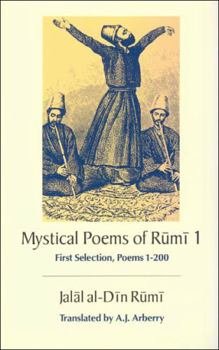The Mystical Poems of Rumi 1
Select Format
Select Condition 
Book Overview
Rumi, who wrote and preached in Persia during the thirteenth century, was inspired by a wandering mystic, or dervish, named Shams al-Din. Rumi's vast body of poetry includes a lengthy poem of religious mysticism, the Mathnavi, and more than three thousand lyrics and odes. A.J. Arberry, who selected four hundred of the lyrics for translation, calls Rumi "one of the world's greatest poets. In profundity of thought, inventiveness of image, and triumphant mastery of language, he stands out as the supreme genius of Islamic mysticism." "An excellent introduction to Rumi, the greatest mystical poet of Islam. . . . Rumi's scope, like that of all great poets, is universal--reaching from sensuous luxuriance to the driest irony."--Sherman Goldman, East-West Journal
Format:Paperback
Language:English
ISBN:0226731510
ISBN13:9780226731513
Release Date:March 1974
Publisher:University of Chicago Press
Length:208 Pages
Weight:0.69 lbs.
Dimensions:0.6" x 5.4" x 8.5"
Customer Reviews
4 ratings
Perhaps The Best
Published by Thriftbooks.com User , 15 years ago
A few years ago, I became acquainted with the mesmerizing, Islamic poet of love, Rumi, and since then he has become, hands down, one of my favorites. His mystical poems are spiritual, universal, and sensuous in nature. They have been translated into many languages; he has been described as one of the most popular poets in American libraries today. I found this volume to be one of the best.
Tried and True translation
Published by Thriftbooks.com User , 16 years ago
Out of the dozen or so different versions, translations, and interpretations of Rumi I've gone through, Arberry is still my favorite. Some say it's a bit stale with the literal translation, but that is far better than someone else's limited interpretation (like Barks or Harvey), especially when today's popular interpreters are unable to dive deep enough into Rumi and simply call him a mystic or a writer of Love poetry. Arberry also includes some notes (though a full addendum is really required to begin to grasp the layers of Rumi), which are helpful. If you do like the modern interpretations, at least read Arberry first. Then you can make up your own interpretations before reading someone elses.
One of the best translations
Published by Thriftbooks.com User , 21 years ago
It is unfortunate that most readers are introduced to Rumi through the "interpretations" of Coleman Barks (you'll notice I didn't say translations). A. J. Arberry's tranlslations are where readers should start; as a matter of fact Barks himself said that he uses Arberry's translations, which should speak volumes in itself. Arberry stays very close to the literal readings and the notes he provides are invaluable when reading these poems. There are a few places where the notes prove very helpful because Rumi plays on words a lot and the double meanings would have went over my head otherwise. And because Rumi's original works haven't survived there are several versions of what might be called his "original" poetry. The differences, when they arise, are included in the notes and there are a few instances where the alternate reading makes more sense than the one given. If you are an avid reader of Rumi or looking for an introduction, this book and its companion volume are a must have.
The Best
Published by Thriftbooks.com User , 24 years ago
This 2 volume set of translations by Arberry and the translations by Nicholson are the best readily available. Numerous "renderings" by popular writers littering the bookstores fail to even touch the depth and layers of meaning to be found in Rumi. These are works of spiritual power brought to life for the english reader by a scholar in the language and history of the Sufi traditions. If you want the real thing, this is it.





